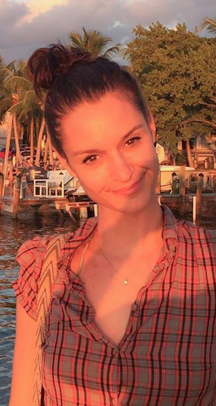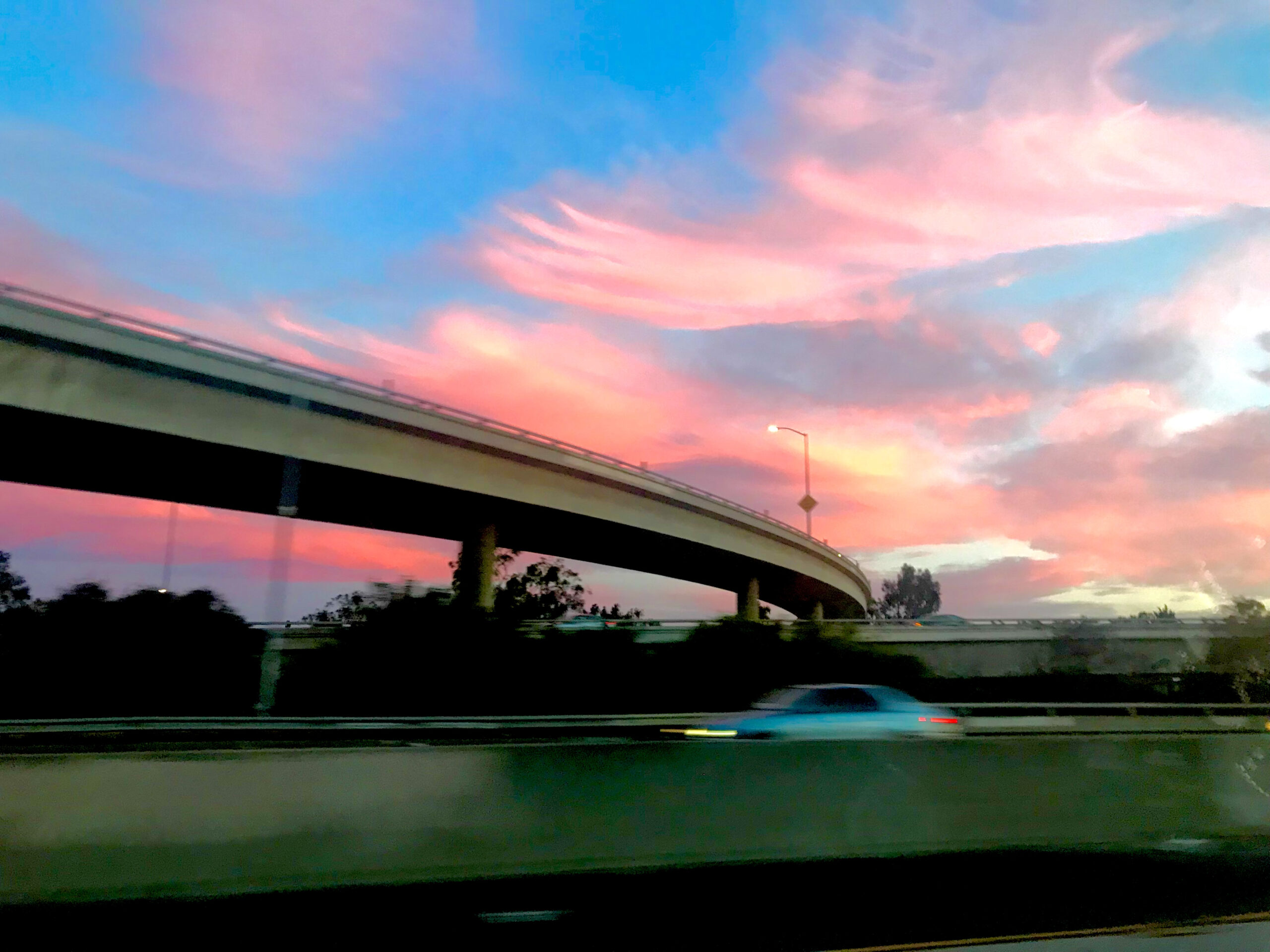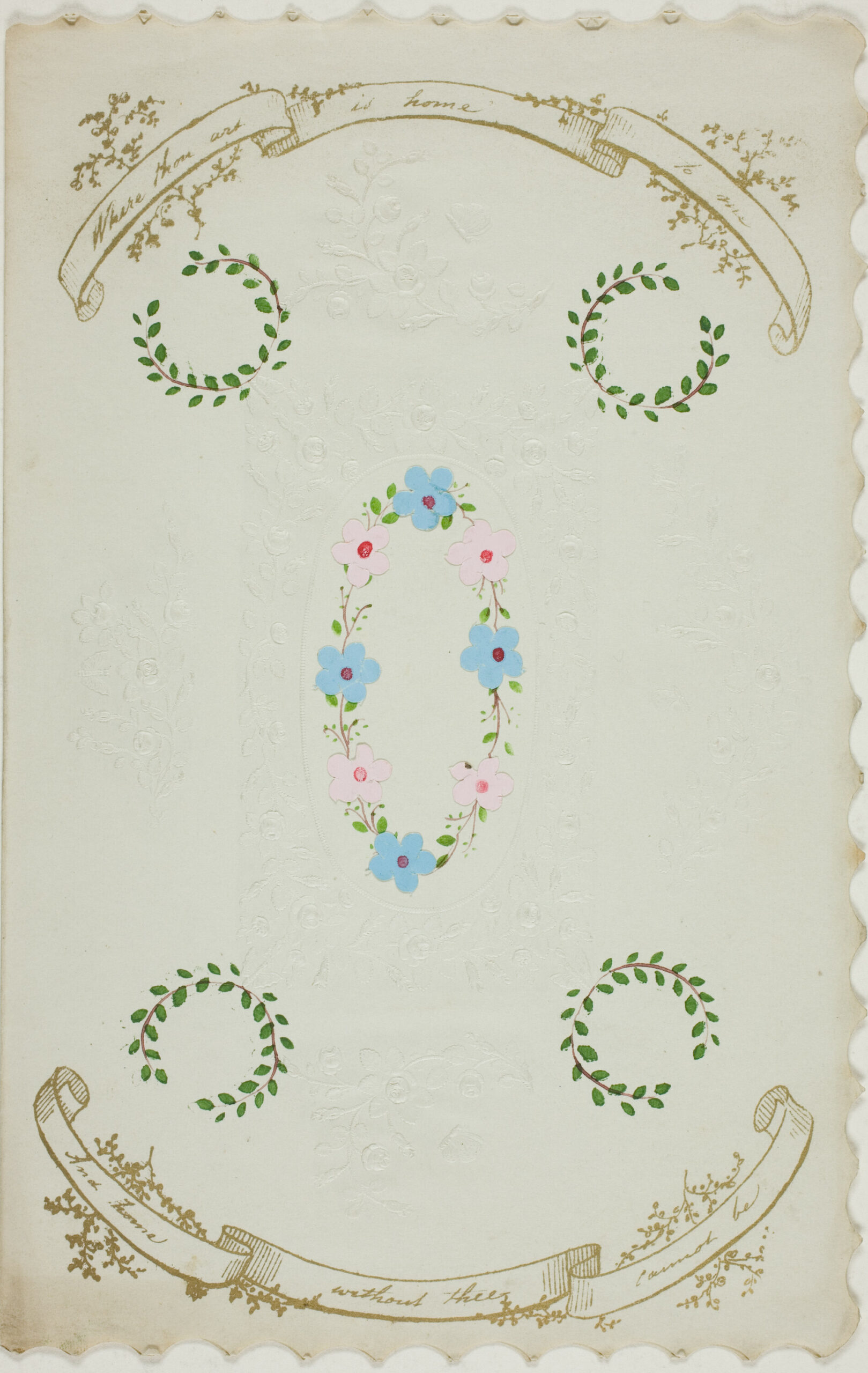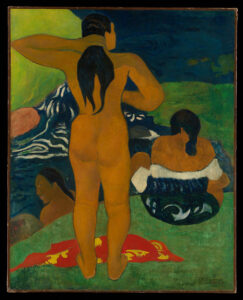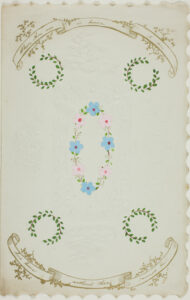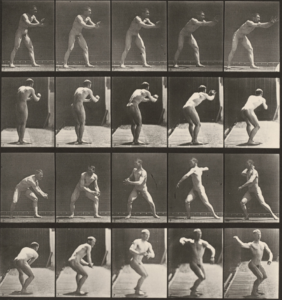Biography of Orange (An Excerpt) After Maggie Nelson
by Chloe Firetto-Toomey
Orange appeared suddenly, as though sung into existence, spelled out in subliminal mist. A pageant-owner-real-estate-mogul-reality-TV-star-president? Trump, the name, ballooned to something larger than the American Constitution because alternative facts present the possibility of all things. “Alternative facts” is a term coined by Kellyanne Conway after she proclaimed a provable falsity regarding Trump’s inauguration crowd in a press interview on January 22, 2017. She later stood behind her words, defining alternative facts as additional facts and alternative information. This very dialogue implies virtue in falsity and emboldens the Administration’s power of deniability. A post-truth presidency: a new morphing of the meaning of democracy; how the word thins to other referents.
•
Nobody knows which came first—the color or the fruit. In old English orange was “yellow-red” pronounced ġeolurēad, which evokes autumnal gutters cushioned with leaves. In the 1500s, citrus was traded in markets across Europe and surfaced as a color. The word seeded and surpassed itself. The color grew, evolved from the fruit. And the fruit evolved from the color. A simultaneous state of affairs.
•
News sources speculate, facts are irrelevant to the outcome.
The Washington Post, Dec 2, 2016:
“The practice of post-truth — untrue assertion piled on untrue assertion — helped get Donald Trump to the White House. The more untruths he told, the more supporters rewarded him for, as they saw it, telling it like it is. “Even fact-checking perhaps the most untruthful candidate of our lifetime didn’t work; the more news outlets did it, the less the facts resonated,” says Susan Glasser, reporting an assessment of the election coverage for Politico.
•
In this sense, orange is a double entendre. And when Trump says: “It will be the greatest wall. The best wall ever,” you find yourself wondering if his repetition is a child casting a spell, wishing for rain. Repeat three times to affirm it. He straightens his tie in the gold-rimmed mirror and says, “It will be a great, great wall.”
•
You may say it’s disrespectful to call our President orange. But he is, and I don’t think he would mind because he isn’t politically correct. He pioneers “free speech,” broadcasts buzz words in razzle-dazzle tweets. Thumbs steam—you could say he is a sparkler in the Oval Office. He has his mother’s strawberry-blonde hair. His red tie dangles below his belt, a red stripe, a cherry-stained tongue.
•
The UK’s National Healthcare Service estimates that twenty minutes on a sunbed is equivalent to four hours in the sun. This recalls the high-intensity orange-workout-theory, which also intensifies time, tortures seconds to minutes. But perhaps Trump doesn’t sprawl in sunbeds like a pearl in an oyster. But stands like a starfish? Arms and legs spread at equal distance, strapless swimming goggles wedged in eye sockets, and gets a spray-tan? A young blond in a tight white dress and dentistry mask mists his face with brown spray. He wants to touch her. She is hazy through the goggles and this drives him wild, her pronounced shapes, the cool fogs of tanning solution dusting his skin. She bends to spritz each crease, contour, crack. The skin around the eye area remains pale, like two patches of white sand. His eyes, two distant ponds.
•
Artificial tanning has the tendency to turn anyone Oompa Loompa orange. This is because sunlight is an even blend of UVA and UBA radiation. Artificial sunlight, however, is laden with UVA, the rays penetrate the deepest level of the epidermis. UVA is a call to action; melanocytes surface and stimulate melanin, your body’s best defense, to form a protective layer. Skin discoloration and damage is inevitable.
•
I recall Starburst Orange, my favorite nail polish. How I painted each toenail from cuticle to tip, emboldening them. That day I left my father at the airport in Miami and returned to Mum in England. I was fourteen. In Paris, Lady Diana enjoyed her last meal at the Ritz. The next day the Atlantic Ocean swelled between my father and me, and Diana was dead. Mum picked me up from Heathrow Airport, and we took the underground to Kensington Palace. We surfaced, two heads in the crowd, whispering, listening to the wind riprap plastic from gas station flowers. Each tree a shrine. I let Starburst Orange fade beneath my socks. I couldn’t remove it, wouldn’t. Orange toes recalled a time before everything had changed. Orange toes brought a strange comfort. Like the pages of old books, sun-washed photographs, lampshades; sunset: when orange copulates and tantrums and settles into dusk, into unreal blues of iris and orchid.
•
Don’t tell me I’m angry because of loss. I’m angry because I don’t understand. How do you become familiar with the unpredictable nature of wildfire?
•
Today, I’m drinking wine before noon, burning sage, watching the 45th Presidential Inauguration. Everyone is white apart from Ben Carson, who missed his ride and walks alone down Pennsylvania Avenue, an island in the crowd.
•
Orange frowns in the wings; his eyes are lowered. You could say, his lips are broken wings. You could say America is fractured, that he is the color of apocalypse. A harvest moon, rising. I want to look away, change the channel, water the plants, feed the cats, but I don’t. I can’t look away. Unpredictable and mercurial, says a News Commentator. Trump approaches, slow and deliberate; he flashes a smile to the camera and mouths hello. He looks terrified, arms stuck to his sides, red tie dangling below his belt. I call a friend and top off my wine. Are you watching this? She’s caring for her sick wiener-dog and there’s a dead animal rotting somewhere in her yard, but I’m welcome to come over. I don’t want to give him the ratings, she says. And neither do I, but I must bear witness. Come over later, she says. Bring wine.
•
On TV, Trump says, what truly matters is not which party controls our government, but whether our government is controlled by the people, which could be Bernie Sanders’ words. The ideology seems well intended, empower the people with the art of rhetoric—call the people to rise. I think of Brexit: should the people have been trusted with such a decision? They didn’t have the right facts. And when Trump says, the establishment protected itself, but not the citizens of our country, I can’t help but resist, and wonder, what rises in the gap between the president and the government, if not a democratic body? A dictator? (Something tells me, mind this gap.)
•
Bearing witness feels like an act of dissidence. I sign petitions, collect shocking media headlines, list accusations made against Trump: rapist, racist, sexist, bigot, bully, liar, con-man—scraps of orange. When words lose their meaning, there is no sense in the world. Repeat a word enough, and it loses its meaning. The word walks to the window of its Miami Beach condo, opens it, and plummets to the boardwalk. Nothing matters. I feel like I’m shouting at the ocean, at night; the wind comes off the water and blows back every word. Make America Great Again.
•
Trump leans forward against the podium and pronounces, “America first. America first.” (The power of repetition—the child, calling, echoes up from the well in threes.) I understand America First means Brexit, Nationalism, A Shield-Wall. Prison bars in the star-spangled banner, blood drying into white cloth.
•
Chanting and spells originate from fire pits. Feet mimic, heart-drum-beats. Shamans in orange robes. Or, voices hum while bodies sit with legs crisscrossed, palms up. Meditative.
•
The crowds beyond the perimeter chant.
•
The inauguration crowd is a small, enclosed thumbprint. Thousands of heads divided by policed bollards, and beyond, thousands of protestors in narrowed streets joggle signs, strain street-blocks, with megaphones: Not My President. My Pussy My Choice. Free Press Free Democracy. I put my faith in people, not God. The magnitude of bodies—heads in the crowd individual details of one collective. By the end of today over two hundred protestors will be arrested, and confrontations will continue into the night. Tomorrow will witness the largest protest in US History—millions will march across America, across the world, for women united against Trump. But what flesh lies beneath the thick pith? Words expand and resonate, like watercolors.
•
In the weeks to come, I research consumer politics; the idea that politicians are marketed to the public in much the same way as Edward Bernays marketed cigarettes to the suffragettes: with the idea of empowerment. Bernays used his famous uncle Freud’s psychoanalysis of group behavior to master his marketing techniques. And now, Trump sells us a metaphorical cigarette—freedom-torch-rhetoric. He employs Bernays’ strategy: call to instinctive fears and desires—marry an image to a slogan; offer a solution, an anodyne to quell the panicked mind of the masses. Language is the magic that makes the world real in our mind.
•
I admire the bright tip of my cigarette. How it flairs when sucked, hot and deep orange, and then, the soft puff of smoke. I blame Bernays for my dirty habit—he coupled the idea of female independence to the act of smoking. In 1929, he marketed the cigarette, a symbol of male power, essentially empowering the suffragette movement with penises of their own, to balance between fingers. He called them Freedom Torches. Every woman should suck and flair, burn cherry embers, holders poised like Lady Liberty—the origin of my addiction.
•
Freud, after studying group behavior, concluded that man is sadistic and an impossible species, driven by irrational forces, which lurk beneath the surface of modern society. This is how democracy shifted to cater to primitive desires. Because primal fear and desire are subconscious and tribal, facts are irrelevant to the outcome. We are irrational beings. And so, instead of active citizens, we remain passive consumers—eating words. Was Freud, right? Irrational yes, but are we not all driven by what we believe to be true? The truth poses no alternative: it is like love in this way. But perhaps, even love is not enough sometimes. I have not yet quit smoking as I promised Mum I would.
•
His words kindle small fires, kicked up with wind and dirt embers. Evangelicals, white supremacists, the alt-right, the “forgotten people” weep and whoop to buzzwords—blood, eradicate, ravages, tombstones—The American carnage stops now. I am witnessing the dawn of a new post-truth era, a reality TV president—is this real? How can Trump stop “American carnage” with liberal gun laws? Why protect our borders when terrorists are homegrown? How can you “eradicate terrorism” when it’s an ideology? A choir palms hymn books. Clerical men loom in the background. God Bless America.
•
Trump’s biographer says he is rich, famous, and unapologetic. That Trump appeals to the brash deniability of the masses.
•
He’s a motherfucker, says my friend with the sick wiener dog. We’re wearing matching Not My President shirts, sitting by her pool in the late afternoon, drinking wine and ignoring the passing stench of dead-animal in the wind.
•
I am angry because the President appeals to the brash deniability of America. I am angry because orange triggers flashbacks—The night I confronted L., with his lies, he hit me to the floor and I didn’t feel the sting; only my phone flying from my hand, how he grabbed it and hurtled it out the window as the small voice repeated, “Hello, what is your emergency?” The rain hit down in fine threads, black sequins tapping the window and I scampered the stairwell; Bella, my small dog, pressed to my chest, fluorescent lights, raindrops on spider webs. My Mac and clothes demonstrate a thousand ways to fall from the window to the gutter. Water-clogged drains. The red and blue flashing lights. Mike, my taxi driver, picked me up a final time. L., a figure in the bedroom window, shrinking into the stark light as I was driven away. Dad picked me up from the bar with Bella and a trash bag of clothes. The ten-hour drive back to Miami, silent. Bella’s head out the window, ear flapping like prayer flags along the interstate, her tongue a fleshy flap of ham. And my mother, in England, calling, always calling, her face flashing my new phone, her unanswerable questions, her calling me to prayer. Her calls stretch across an ocean.
Sorrow is a habit I want to break. Sorrow, my therapist says, belies anger. They are companions, the two crutches used to uphold you.
•
In nature, aposematism is the concept of warning coloration in creatures that pose no harm. As a child, I distrusted orange and refused to touch a starfish. I watched as my father dipped his hand in the shallow water and dragged a finger across its barnacled surface, as though reading in braille its story of orange. A rusted star in a paralleled sky, tidal strokes shadowing the fine globes that patterned each arm, how perfectly it hugged the rock.
•
Like a detective at a crime scene, I finger the ashes; read an article in New York Magazine titled: “At Yale, Psychiatrists Cite Their ‘Duty to Warn’ About an Unfit President.”
Dr. Bandy X. Lee, a diminutive Yale psychiatry professor who organized the meeting puts it this way: “We have a ‘Duty to Warn,’ about a leader who is dangerous to the health and security of our patients.”
The art of Trump’s rhetoric is that meaning is a murder-suicide house. Perhaps even a supermassive black hole; meaning, like gravity, collapses upon itself.
Dr. John Gartner, a psychologist and former faculty member at Johns Hopkins Medical School says: “He does lie to my face — every night. I watch TV!”
In this sense, Trump is a truth defoliant leaving only the fictive skeletons of trees. I see him, a boy, always running from the fire.
•
I live in a constant state of panic. How could all the steel barrels labelled flammable in orange triangles, or cautionary tape or bodysuits or nuclear waste or herbicides or gas masks or Oompa-Loompa-orange, not be warning flares fired into a dark, cold night, from a punctured ship?
•
Orange is the color of revolution—imagine the Neolithic. The first expansion of consciousness: a small flame in the limestone cave. Smears of pollen, ochre, and beetroot across the dry, uneven stone. The first human to see images come alive—gargantuan bovines shivering their legs with licks of light. This is how art expands consciousness as light dilates pupils.
•
On this account, orange is the color of excitement. On the color wheel. It combines the energy of red with the happiness of yellow. Blend of passion: life-blood, organ-heat, and imperative joy: pollen-saffron-yolk; yellow spots on red toadstools known as Viking mushrooms; red and yellow light piercing the shapes of trees; red and yellow interplay, on crustacean shells and seashells. Golden ratios. Harvest moons. Monarch butterflies in migration.
•
From our secret beach, a kayak is a hilarious orange squiggle on the horizon. Alan is embarrassed, you can’t see it’s a man? he says. He seems self-conscious, I think he knows we’re laughing at him. My face, a wet rag. Later, we watch the fiddler crabs, the interplay of shell and grain, illusions of wavering patterns. The mushrooms are waning, the sun lowering, and my eyes adjust to tens of tiny fiddler crabs, darting in and out of holes, small mounds of sand. They wave a large claw up and down, as though conducting a silent orchestra. Each crab no larger than my thumb. We have been still so long, they erect a city around us. Fuck off! One says to another. They advance and retreat, a scuttle-dance, an invisible tug-of-war. Others appear and retreat like whack-a-moles. A comedy show then, tense. A hermit and a fiddler crab have a standoff. Matchstick-eyes shifting. How is this so interesting? The hermit crab lumbers toward the sawgrass dunes.
We joke about our remote setting: how funny—to feel safe we had to travel to the edge of the world. Nobody will ever know our infantile joy or aging wisdoms, or how the water reflects a line of fire.
•
Orange trees blossomed in Northern India and Persia and spread east across Europe. Portuguese, Spanish, Arab, and Dutch sailors planted orange trees—small nutritious suns along trade routes for sailors to pick and enjoy. Vitamin C is the essence of orange and scurvy prevention. The fruit was associated with well-being, nutrition, sea legs on the sand, sweet juice rivulets saturating beards. On his second voyage in 1493, Christopher Columbus brought orange seeds, lemons, and citrons to Haiti and the Caribbean. Spanish explorer Juan Ponce de Leon introduced them in Florida in 1513. Seeds mingled with dirt in their deep pockets. The seeds held memories of home, which they fingered and palmed in their deep pockets.
•
Frederick Trump, I suspect, did not have a tinted epidermis. But his hair was copper. He emigrated from Bavaria, Germany, in 1884, to avoid mandatory enlistment in the Imperial Army. His pursuit of happiness was sculpted by knowing what he didn’t want. Stripped of citizenship, he raised his family in a German-speaking section of the Bronx, NYC.
Fred Trump, Donald’s father, was thirteen when Frederick died of the flu during the pandemic of 1918. He left an estate valued at $31,359 to his wife, Elizabeth, and their four children. Fred Trump, after a period of mourning his father’s death, was inspired to call his father’s friends: business associates from the gold rush and boom-town era. He raised enough money to persuade his mother, Elizabeth, to start a business in property construction and management. E. Trump & Son was established in 1919, but Fred was only fourteen at the time and had to wait until 1927, when he turned twenty-two, to become legally incorporated.
•
Dad says it’s easy to make money when you have money; making your first million is the hardest. Like Trump, Dad is a true capitalist. Unlike Trump, Dad is a true capitalist because he is self-made. A jazz musician gone rogue, trumpet player and telephone salesman, then businessman and entrepreneur. His businesses span from Total Environmental Solutions to failed casino contracts to a solid working relationship with Indian Tribes, particularly the Kiowa, who ordained him an honorary member, naming him Tohn-Tahlee which means keeper of the water. Dad lost his fortune during the Obama Administration. He fell into the bottom band of the highest tax bracket, said he paid almost half his annual income to the government—penalized for his diverse income. He gave his vote to Trump but says he voted against Hillary because she’s evil.
I’m angry because I feel attacked. He has daughters. He was a jazz musician for twenty years. He has an environmental company. Sitting with him at the bar he says he’s all for the arts and civil rights, but not when he can’t pay his bills. He says Trump won’t fulfill his campaign promises because congress won’t allow it. There are too many sanctions in place. I wonder how many people presume America is one static emblem of nobility.
“What’s with your t-shirt?” asks Dad. “Why not Indian Lives Matter? Everyone always forgets about the Indians.” We’ve had a few beers, and he insists Indians would rather be called Indians than Native Americans. He tells me about the reservations in North Dakota—families with two, three, four, five, children living in trailers, choosing between heating or food for the winter. Too many suffer from malnutrition and obesity. Too many denied mortgage and seed money. “The Federal Government never stops fucking them and I’m going to change it.” His eyes shine in the bar lights. This is my father’s call to action.
•
When orange settles beneath the clouds, giant molars—purple and gold, press the water to the tidal ventricles of the shore, I walk the beach and cry to the horizon; it feels like praying—wind rushing cries or prayers from that line of fire; thinning luminous light, cresting; a squadron of pelicans arrow the sky, torpedo the darkening water. The truth is relevant to every outcome.


